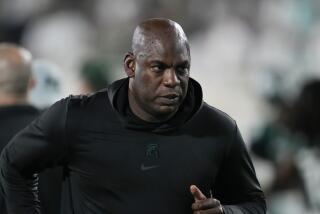Lead singer of Dixie Hummingbirds group
- Share via
Ira B. Tucker, lead singer of the Dixie Hummingbirds, performed a style of gospel music that erased boundaries between music and movement, praise and performance, style and spirit.
For 70 years Tucker and the Hummingbirds gave high-energy, emotion-drenched shows designed to please the Lord and wow audiences.
The group influenced a long list of R & B artists and could have crossed over from gospel to secular music. But that was one boundary Tucker and the group were not willing to erase.
“I was in a record executive’s office with $44 in my pocket,” Tucker once said. “And he was offering me $10,000 to sing rhythm and blues. But we turned it down because we started in the church, and we had more respect for God than that.”
Tucker died of heart failure Tuesday at an extended care facility in Philadelphia, said his son, Ira Tucker Jr. He was 83.
The versatile performer, who sang baritone, tenor and sometimes bass, also wrote songs, including “Christian’s Automobile” and “In the Morning.”
During the early years of his tenure, when the group was struggling to distinguish itself from other a cappella outfits, Tucker began to help the group forge a unique sound and style.
“He really moved the Dixie Hummingbirds into what we call the ‘soul gospel’ era, which would roughly be throughout the 1950s,” said Jerry Zolten, author of “Great God A’mighty: The Dixie Hummingbirds Celebrating the Rise of Soul Gospel Music.” “We begin hearing instrumental accompaniment. We begin hearing that expression of angst and soulfulness that we associate with the best of Southern soul. We began to hear a different kind of rhythmic feel.”
Onstage, Tucker became the model for what one musicologist termed “the activity singer.” He dropped to his knees, gestured, pointed, ran up the aisle of the performance venue. Artists including soul singer Jackie Wilson, Bobby “Blue” Bland and the Temptations found inspiration and example in the Hummingbirds.
“During those golden years, he was paired with James Walker,” another Hummingbird, Zolten said. “They were like pistons, firing the melody back and forth until the audience was in a frenzy. It was something to see.”
Born in Spartanburg, S.C., on May 17, 1925, Tucker was initiated into the world of making music and money at about age 6 after he learned to whistle.
“He’d go door to door and whistle, and because he was so little, people would give him money,” Ira Tucker Jr. said in an interview with The Times. “He listened to birds, and got their sounds down.”
Soon Tucker advanced to singing. Beneath a street light, he sang, and people would sit on a hill nearby and listen to him perform. “That’s how he got noticed by the Dixie Hummingbirds,” his son said.
In the late 1930s, a teenage Tucker joined the Hummingbirds. By then the group had been together 10 years and had put in place a set of rules that kept the members on the straight and narrow: no drinking, no smoking, no running around with women, no secular music.
Once, when he was still new to the group, Tucker sneaked into an outhouse to indulge his smoking habit.
“I smoked so much they thought the outhouse was on fire,” Tucker said years later. “Everybody was yelling, ‘Tuck, are you in there?’ ”
For that indulgence he paid a stiff fine of $5.
Over the years, as the popularity of the group grew, the men sang throughout the country at black churches and gospel extravaganzas and performed often at Harlem’s Apollo Theater. In 1942, they sang at the Cafe Society, an integrated nightclub in New York.
“Ira was really proud of the role the Dixie Hummingbirds played in overcoming social injustice and prejudice,” Zolten said. “He was proud of the time spent working in Cafe Society in New York, breaking down the barriers of segregation in the 1940s.”
In 1945 Tucker rented the Metropolitan Opera House in Philadelphia for a Hummingbirds concert -- against conventional wisdom that said the venue was too large for gospel artists.
The Hummingbirds sang at the Newport Folk Festival in 1966 and later toured Europe. In 1973 they recorded with Paul Simon on “Loves Me Like a Rock” and soon after released their own version of the song, which won them a Grammy Award.
In more recent years Tucker collaborated with Wynonna Judd on “How Great Thou Art” and recorded a country album. Tucker and the group were inducted into the Grammy Hall of Fame; and in 2007 his album “Still Keeping It Real: The Last Man Standing” was nominated for a Grammy.
“He had an eclectic mind,” his son said. “He did gospel music, but he took it to a lot of different areas.”
In addition to his son, Tucker is survived by his wife, Louise; two daughters, Sundray Tucker of Philadelphia and Lynda Laurance of Sherman Oaks, both of whom are vocalists; five grandchildren; and six great-grandchildren.
A funeral will be held Wednesday in Philadelphia. Memorial donations can be sent to the African American Museum, 701 Arch St., Philadelphia, PA 19106.
--
More to Read
The biggest entertainment stories
Get our big stories about Hollywood, film, television, music, arts, culture and more right in your inbox as soon as they publish.
You may occasionally receive promotional content from the Los Angeles Times.










